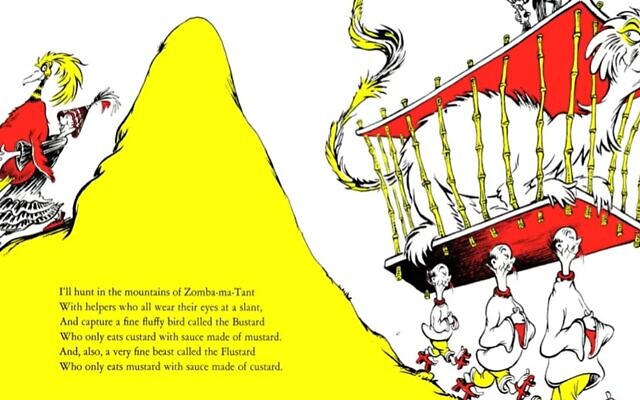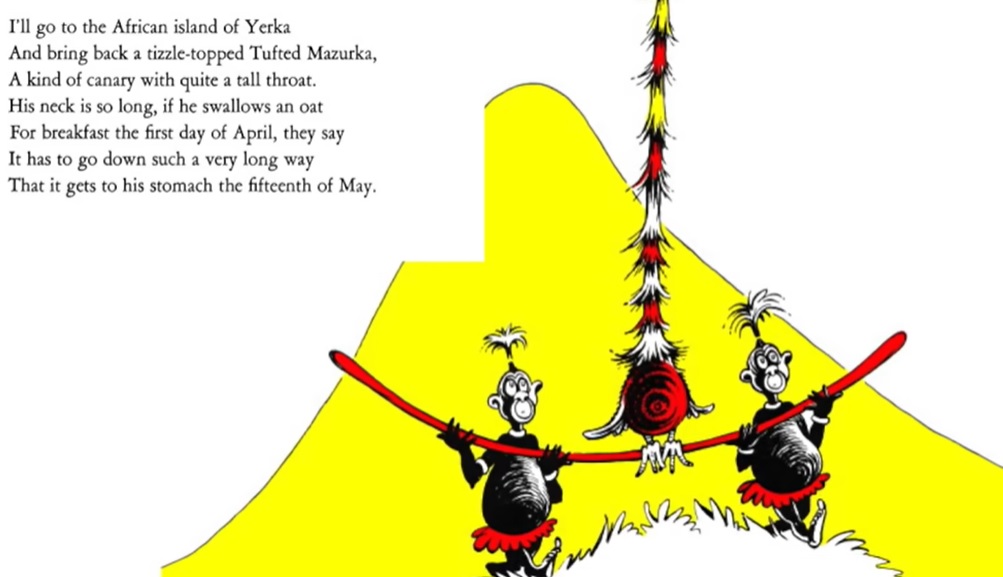As I mentioned in my last Rant Rave Review, as of last Monday, six books by Dr. Seuss are now officially out-of-print, and they are out of print due to supposedly racist, offensive, and/or stereotypical images. The company that owns the rights to these books is no longer publishing them and some websites are no longer selling them. People who do own the books, or who swooped into stores and bought them the day of the announcement, are now selling them for hundreds or thousands of dollars. So, what are we to make of all this?
Is Dr. Seuss Racist?
There are actually three questions here: is the man racist, are his books racist, and are those images racist? The answer to the first is, he kinda was, and then he got over it. During the war, he was openly against the Japanese, and in favor of the internment camps, then went to Japan during the occupation and realized, hey, maybe these are just people. Apparently, he wrote Horton Hears a Who in response to the US occupation and dedicated it to a Japanese friend. People can change, if you let them.
Okay, well, what about his books? This is an obvious "no". Race basically doesn't come up in Dr. Seuss stories, except "The Sneetches", which is actively against racism. Which, in some people's fevered imaginations, makes it racist. Yes, in some Olympic-level mental gymnastics, saying that whatever race you are isn't important, ie being against "racial essentialism", means that you are a racist. Such people think that the story doesn't address "structures of power" and "systemic oppression". This is true. It's instead a story about a sleazy businessman who goes in and preys on existing racial biases in order to make a buck, constantly telling people to think of their identities in terms of their outward appearance. You'd think the racial essentialists would appreciate the representation.
But I digress.
What about the images themselves? Are they racist? Not having seen all of them, I can't say for sure, but some are definitely cringy. Take the yellow skinned "Chinaman who eats with sticks" in And to Think That I Saw It on Mulberry Street. Though one could argue that the entire book uses only five colors: yellow, red, blue, and touches of purple and green, this man is the only human whose skin is colored at all. Later editions of this book have actually changed the image and text:
Should the Books Be Banned?
Again, I think there are a couple questions here: are these books being banned, and should they be banned?
In our increasingly-willing-to-cancel culture, people like to talk about the difference between government censorship vs. corporate censorship, which is a valid topic. But when it comes to huge corporations like Amazon banning books from their website for hate speech or Ebay halting the ability of vendors to sell certain titles on their platform, to say "it's a private corporation, so it's not censorship" is disingenuous. Maybe it doesn't violate the First Amendment, but it is censorship. A single bookstore refusing to sell a book, a single library refusing to carry a book, is censorship.
A single company that owns the rights to a book refusing to sell it is 100% censorship. I'm personally offended by the idea of any book being out-of-print in the day and age of print-on-demand, but I'm especially sickened when companies pull this nonsense. This is similar to foreign companies who refuse to publish novels, games, and videos in English copyright striking fanlations; they are not losing money, so why do they care?
In the case of the Seuss estate, or whoever owns the rights, all that they are doing is denying poor people access to books. That's right, if you can shell out $786 for a children's book, you can read these delightful stories. What's that? You're a single mom who works two jobs? Well, sucks to be you.
What's really vile is that people are saying, "It's only six books. You still have the others." First off, this is admitting that those six books are now censored and unavailable. Secondly, this is a stupid argument. It's like saying, "Well, the Nazi's didn't burn every book in Germany. There were plenty of others." What if I wanted to read the ones that were burned?
And that brings us to the question of whether or not those books ought to be banned. Heck, should they even be altered? Some of you might have balked at my saying I was fine with the images being changed; isn't that censorship? I think that would take it's own blog post, but here I'll just say that I don't think the changes I discussed would really alter the content, message, or meaning of the work. That being said, I don't think you have to change the images either.
That is, I think it's okay to publish, purchase, own, and read problematic material. As many commentators have pointed out, no child is going to be made into a racist by reading these books or seeing these images. Any racist or even iffy overtones are going to go right over their heads unless parents point them out. If, in the one in a million chance, your child actually notices anything wrong with the images, like "why is his skin yellow?" or something, then you can have a conversation about how sometimes, back in the day, people drew some not-so-nice pictures of Asian people and thought their skin should be painted as yellow, but we don't do that anymore, but this book was written a long time ago, etc etc. If they ask about what a Chinaman is, say it's an old word for a Chinese person, but you should never say it, because it can hurt people's feelings. Talk to your children; it isn't hard.
Should Any Books Be Banned
If you've been paying attention to what's been happening in book land lately, you'll know that Dr. Seuss's books are not the first to be put on the chopping block. Last year, Abigail Shrier's book, Irreversible Damage: The Transgender Craze Seducing Our Daughters, was removed from Target due to requests of trans activists. It was returned after backlash. Now I think it might be banned again? Who can even keep up anymore. Similarly, When Harry Became Sally: Responding to the Transgender Moment, by Ryan T. Anderson, has now been removed from Amazon for being "hate speech".
In the microcosm of the library world, I've had some people take issue with certain controversial books. When processing our new books, my part-timer picked up Irreversible Damage and asked, "Did someone request this?" as if we shouldn't have ordered it if they didn't. Both that book, and White Fragility: Why It's So Hard for White People to Talk About Racism, by Robin DiAngelo, were face out in our new book area, since they were the newest books. The former was turned backwards or put spine out with the older books multiple time by patrons, the latter turned backwards once. During the election, I found books for and against Trump hidden behind other books.
My question for people who do this in the library, and for corporations who do essentially the same thing on a massive scale, is who exactly do you think you are helping? Do you think anyone's mind is going to be changed on Trump? Or transgenderism, or white fragility, just by reading a book?
If the answer is "no", then why bother banning or hiding them? If the answer is yes, then that means you think books have the power to change minds, but you want to deny that opportunity to people. Rather than debating ideas, or writing a better book, or showing people why they shouldn't think a certain way, people are increasingly trying to banish certain ideas entirely. How dare an author question X, Y, or Z idea? How dare people be allowed to have an opinion different from the one we say they should!
What's so frustrating about cancel culture and censorship is that people think they really are trying to do the right thing. What they don't realize is, the people they cancel also think they are doing the right thing.
Take Irreversible Damage: obviously, those that want it banned think that trans kids will be hurt by the ideas expressed in the book, that they will be denied hormones and surgeries and so forth. I'm sure Abigail Shrier believes that trans kids would be hurt by no one examining the idea of wether or not they should be given hormones and surgeries as minors. Both sides care about kids. Both sides are trying to figure out how to help people. If you think that Shrier is wrong and her book is dangerous, then write a more compelling argument explaining why she's wrong.
An example of the right way to go about this is with White Fragility, a book that some people see as problematic, if not racist against white people or black people or both. People have written books specifically refuting the ideas in the book. Others have compiled titles that handle race more tactfully and that can be read instead. And that's the thing; you can choose what to read. You can choose never to read a book deemed problematic, but you have no right to take that choice away from other people.
Where Do Libraries Fall Into All This?
That "right to read" is one of the pillars or librarianship. The reason libraries exist is so that all people, regardless of money, have equal access to books, movies, and other aspects of our shared culture. We librarians understand that books are important not just for education, but also entertainment and escape. Stories are how we as humans process ideas, and everyone has a right to expose themselves to ideas--even controversial or dangerous or flat out wrong ones. They have the right to examine different sides of an issue and form their own conclusions. To try and control what a person reads is to try and control what they think, and no government or corporation has that right.


No comments:
Post a Comment